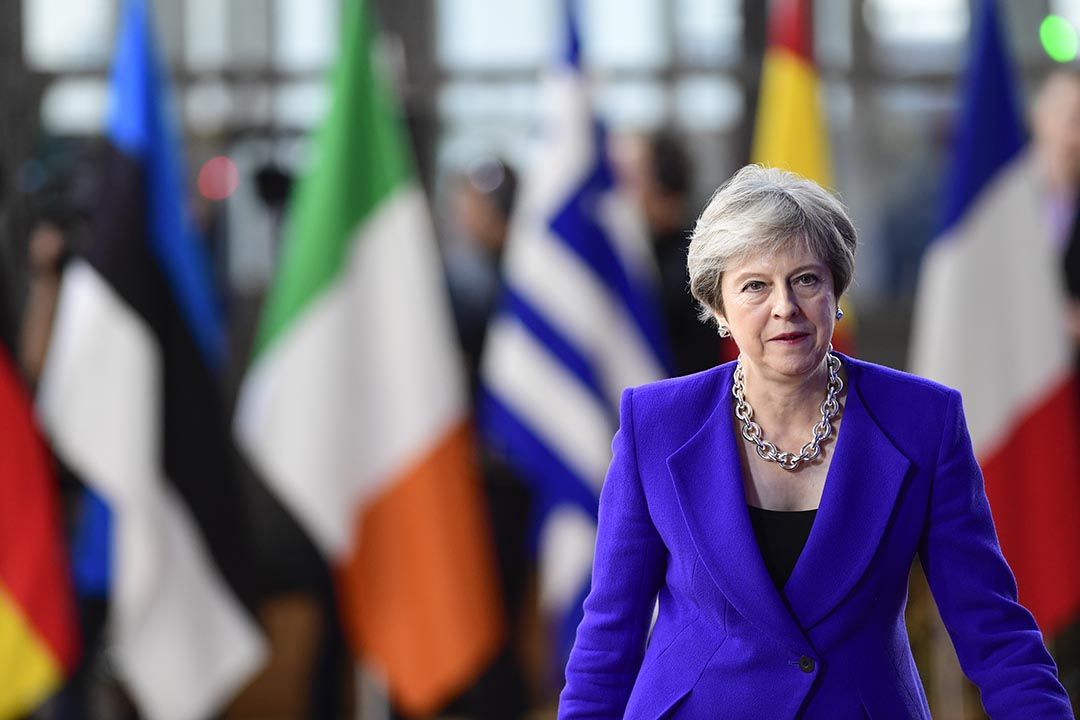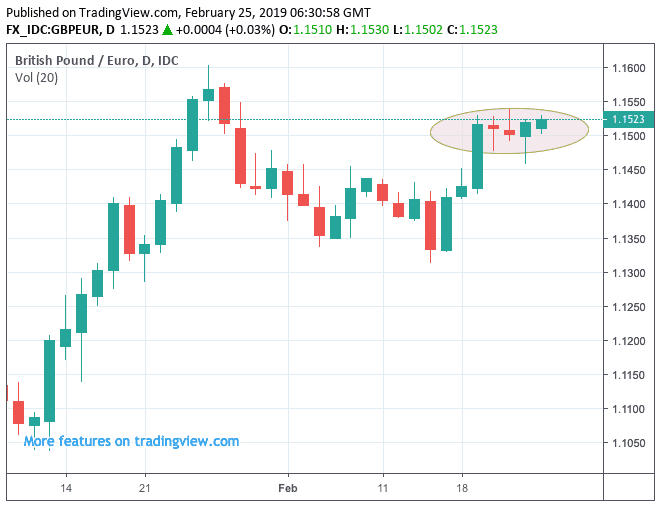British Pound 'Breakout' Looms with Markets Eyeing Crucial Parliamentary Vote Midweek

Image © European Union.
- Pound sees volatile trade at start of new week
- But, ultimately respects recent ranges
- Potential 'breakout' looms on midweek parliamentary votes
Pound Sterling has seen a volatile start to the new week with gains turning into losses, with the moves ultimately reversing. The currency is therefore in a consolidative mode against the Euro, Dollar and other major currencies as traders await the outcome of a series of key votes due in the UK parliament this week that could ultimately result in a delay to Brexit.
Against, the Dollar, the Pound is broadly unchanged on the day with the exchange rate quoted at 1.3068. The Pound-to-Euro exchange rate - which gives us a better feel for Brexit-related sentiment - is meanwhile quoted at 1.1520 at the start of the new week, if we look at the below chart we can see the pair has been more-or-less unchanged for four consecutive days of trading now which tells us something about the state of the market.

Above: Sterling is consolidating ahead of potential bigger moves, leading us to try and assess the potential triggers.
This consolidation indicates a market that is awaiting potentially significant events which could trigger substantial moves, either higher or lower. This phenomenon is typically referred to as a 'breakout' and can often lead to more sustained directional moves in a currency pair.
Sterling's consolidation is entirely understandable considering this week sees UK parliamentarians vote on the government's current Brexit strategy when it puts to parliament an amendable motion. The amendable motion is not binding on the government, therefore the government can continue as it wishes regardless of whether or not it wins the vote.
However, parliamentarians will be able to put forward amendments which could potentially force the government into a change of direction on Brexit if they are successfully vote through.
Any amendment that could delay Brexit and potentially eliminate a 'no deal' Brexit could be significant for the Pound and result in upside.
"To delay Brexit or not to delay Brexit’, that appears to be the key question for UK politicians and for Sterling traders at the start of yet another ‘key’ week in the Brexit saga," says Austin Hughes, analyst with KBC Markets. "Of late, Sterling performed rather strongly as investors assumed that both the EU and the UK would do everything to avoid a no-deal Brexit at the end of March. A delay was and still is one of the options to avoid such a no-deal scenario."
The House of Commons will vote again on the Brexit deal on Weds after a statement updating MPs on Tuesday.
Prime Minister Theresa May on Sunday ruled out bringing a final "meaningful vote", but promised to do so by March 12.
"So this will be another advisory vote, with attention squarely on the amendments tabled by backbenchers. In particular, the so-called Cooper amendment seeks to force a Brexit delay on the government in the event of no deal being reached by March 13," says Sue Trinh, a foreign exchange strategist with RBC Capital Markets.
Trinh says this amendment is more likely to pass than was the case in January when a similar amendment was rejected by MPs who were willing to give the government another shot at negotiating a better deal.
Time to move your money? Get 3-5% more currency than your bank would offer by using the services of foreign exchange specialists at RationalFX. A specialist broker can deliver you an exchange rate closer to the real market rate, thereby saving you substantial quantities of currency. Find out more here. * Advertisement
While the passing of anything that prevents a 'no deal' Brexit is positive for Sterling, there are potential snags to consider.
"It is less clear that GBP would rally as passage may cost several cabinet ministers their jobs. May's choice of 12 March at the latest is clearly aimed at limiting support for this amendment," says Trinh.
We heard reports this weekend that a number of cabinet ministers are prepared to quit the government if a 'no deal' is taken off the table. According to reports Amber Rudd, David Gauke and Greg Clark say they're prepared to defy the Prime Minister and push for a delay to Brexit in the event of her deal being voted down.
If they were to back the Cooper amendment and vote against the government this week, they could be forced to resign their positions. This leaves the government in an increasingly unstable position and could raise political uncertainty, something the British Pound is averse to.
Therefore, what should be a potentially straight-forward event for Sterling could yield detrimental outcomes and we are therefore uncertain as to whether any break-out in the Pound-to-Euro exchange rate will be higher, lower or whether the currency will break out at all as the bad balances the good.
It is important to note however that reports in the media are not clear as to whether Gauke, Rudd and Clark would vote against the government this week.
The Daily Mail - which carried a letter from the three ministers - reports that if Brexiteers in the European Research Group scupper a deal the trio will back other MPs to try to force May to extend Article 50 and delay Britain’s exit from the EU. Therefore we imagine that they could be waiting until after a 'final vote' on the Brexit deal before moving. Perhaps this is not the week to move.
However, a report in The Times says the trio "made clear on Friday that they intended to vote for the backbench move to force a delay in the absence of an agreed deal".
Another minister quoted by The Times said that they would not be "fobbed off" until March 13, saying: "We have given the PM the benefit of the doubt twice.” The minister added: "She must rule out no-deal clearly and unequivocally or it will be taken out of her hands."
Clearly there is uncertainty, and this could keep Sterling 'locked down' for a while yet.
May told journalists at a summit in Egypt that Brexit negotiations would resume in Brussels on Monday in order to try and secure legally binding changes to the Irish backstop clause contained in the Withdrawal Agreement. The legally binding changes are required to prevent Britain from being trapped in the EU's customs union indefinitely and the Brexit deal will not pass through parliament until such changes are agreed with Europe.
The original deal was rejected by a 230 margin on January 14. May has been forced to give parliament two opportunities to determine what happens next, the second opportunity is this Wednesday's vote.
Reports out on Monday morning suggest the government is considering different options on what to do if parliament fails to approve Prime Minister Theresa May's deal to leave the European Union by March 12.
May's decision to push back a vote on her deal, which she is trying to change in talks with the EU, has triggered reports that she may be forced to extend Article 50, which launched the two-year Brexit negotiating period, beyond March 29.
She has so far stuck to her line that any extension would only defer a decision on Brexit rather than solving the impasse in parliament over whether to approve the deal.
The government is "considering what to do if parliament makes that decision (does not pass the deal)", a government official told Reuters when asked about a possible extension.
Time to move your money? Get 3-5% more currency than your bank would offer by using the services of foreign exchange specialists at RationalFX. A specialist broker can deliver you an exchange rate closer to the real market rate, thereby saving you substantial quantities of currency. Find out more here. * Advertisement
